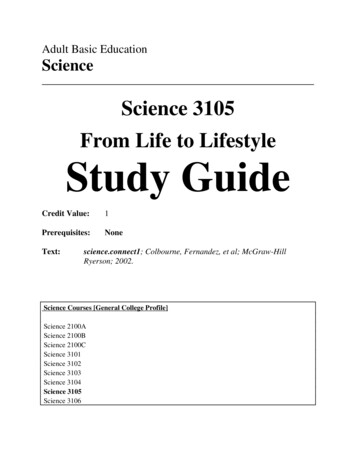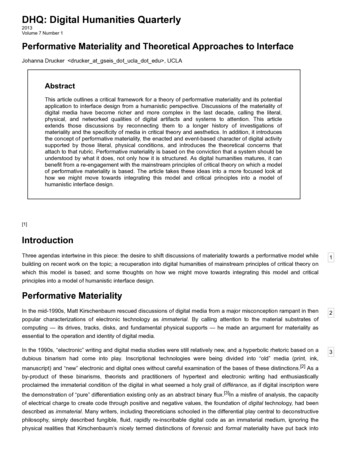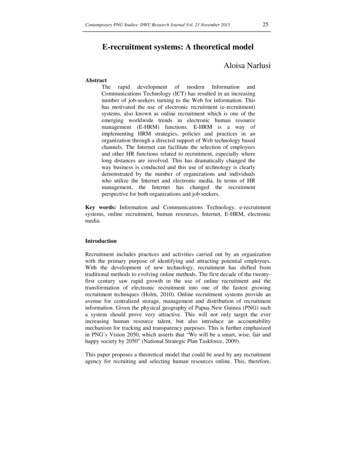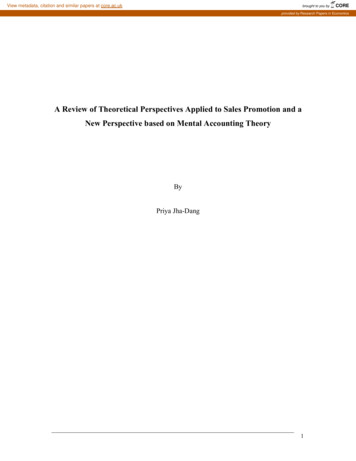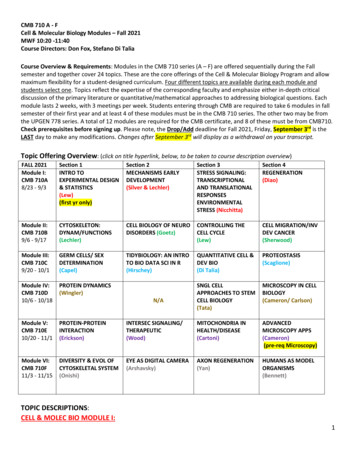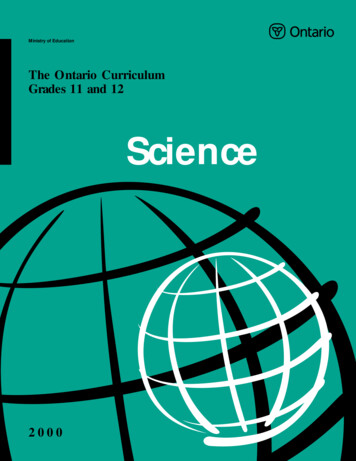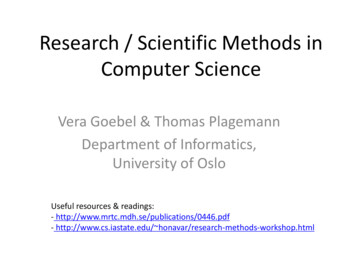
Transcription
Big Boy. Smarts So Big, Senses So Little:The “theoretical” science of the respectablephysicist Prof. Dr. J. Robert Oppenheimer of theInstitute for Advanced Study in Princeton, and60,000 Hiroshima funeralsCamille AkmutAbstractHis smarts so great, his senses so little. A cautionary tale for all ofcomputer science! And, in particular, those computer scientists who seeno moral dilemmas in working for various ‘big tech’ companies, or States.1
Non-dedication to a certain German physicist-turned-historian-for-betterand-worse, with a feverish fixation on Einstein, and who conceives of hisnot-respectable Institute as a place for “basic” science, in the humanities.(This great, great fool.) – so, he told an investor from Switzerland, whoseemed, himself, much more concerned with the buildings, or real estate,than with the science. (Bless him, what else.)—Perhaps, this gentle and bon-vivant investor had plans to open up acasino or retreat spa for the upper classes in the middle of Dahlem.2
Figure 1: Alain Resnais’ Hiroshima mon amour (1959)Figure 2: Isao Takahata’s Grave of the Fireflies (1988)3
1Introduction : the role of historyHow do we render correctly events such as an atomic bomb dropped onhuman beings – so that it won’t happen again? In pictures? In diagrams1 ?In paintings like Guernica? Imagination? In numbers? In the equationsthat underlied them? In poems? In film? Songs?In his first feature film, Hiroshima mon amour, the endlessly greatAlain Resnais, not many directors can be named of his caliber, had doneso in the style that was characteristic of his work on memories and thepast2 , by superimposing images of a couple embracing and an empty city(that of Hiroshima). Because, we are not an expert on the effects of atomicbombs on the human body, and never wish to be, we can only wonder :do bodies, flesh and bones melt, and become one with the city, stones andasphalt, dust?In the 1988 Grave of the Fireflies, Studio Ghibli director Isao Takahataleft the poetic for the real in his descriptions of the firebombing of Kobe,where bombs had been dropped from the sky that did not hold uranium,but fire : a boy looks onto his mother, unfathomable, inhuman.Are we approaching the contents of the dreams of the Prof. Oppenheimer, when we look at images such as these and don’t look away?—As for us historians, who are not amputated of a sociological eye, orvision, we prefer to look at people and their sociological characteristics, ofwhich Durkheim had already highlighted in the 19th century two majorcomponents : family and education. “Nothing is more important”.This is a lesson that our modern Royal historians – both in the senseof their social origins and their styles and preoccupations – have not quitelearned yet. From Dahlem to Vienna, where once nobility had lived andnow new nobility lives.—–The Prof. Dr. Oppenheimer.His smarts so great, his senses so little. He deserved much more thana kick : 60,000 of them, according to figures, one for every death. But,what good is judging from the comfort of the present? Such was neverthe role of history.It is, however, the role of history, or rather historians to look back atthe past as some sort of mirror, if not warning to us : and, in this past,we see many, many reflections of our present times.(We could not blame anyone for thinking idealistically that knowledgewas purely cumulative, and with it came irreversible advancement.3 )1 Such diagrams, including a reverse-engineered one of “Little Boy”, can be found in theannex of Ray Monk’s biography of Oppenheimer, for instance. (Monk 2012.)2 A technique shared with Chris Marker, this other great left-bank filmmaker, and analyzerof dreams and memories.3 The development of science, and knowledge from it, is rendered correctly in the book TheStructure of Scientific Revolutions by Thomas Kuhn.4
Mark Weber, along with many others, wrote that a sound knowledgeof history was the best tool to predict the future : we can only hope thatof Oppenheimer is not ours – while expecting worse.—The cautionary tale of the respectable “theoretical” physicist Prof. Dr.J. Robert Oppenheimer is rendered here for this reason.—“Oppenheimer was overeducated ”, in many fields, his own, and thosethat lied outside of the academic tradition, observed Nobel Prize winnerin Physics Isidor Rabi4 . But, education, obviously is not enough! It wasnot enough, in the most obvious ways, in the case of this physicist.And, neither was it in the case of the geophysicist Francis Birch, whooversaw the development of with atomic bomb with cruel codename “LittleBomb”. Or, Edward Teller.“Intelligence without heart is sterile”, this quote, that we have alreadycited many times, and whose origins escapes us, is not one that can befound in any physics or computer science books, even though it should bean epitaph to any and all of them.This big boy of sixteen feet tall Oppenheimer. who was laughed outof the White House like the fool that he was, once he understood – whathe had done, to himself, to others, and what they had done to him.4 Rabi1969. (Rabi was a close colleague of Oppenheimer.)5
2Social origins that make blindIn addition to the 60,000 deaths caused by “Little Boy”, which is to sayby our “big boy” (smarts so great, senses so little), another 60,000 injurieswere reported. How many of those included blindness?—–We are tired, so tired of reporting on the same social origins, againand again, with the same consequences, again and again, that : it willcome as perhaps no great surprise to those who have read our studies onthe new sciences and technologies of our own times, days, that our “bigboy”, too big for his size, the respectable physicist Prof. Dr. J. RobertOppenheimer, also came from these same oh-so fine upper-classes.And, we do not even need to look up biographies of him, whose coversspeak variously of “tragedy” and “agony”, to write of them in generalterms, though we will come to the fine print, the one that Oppenheimerhimself didn’t read, later :Geographical seclusion precedes social exclusion. Or, perhaps we shouldsay “exclusive”. These social origins are always the same, and always, almost, lead to similar results, which are a real, lived sense of living “outsidethe world” – the common world of common folks.Social origins that make blind, we write. to the struggles, and thepains of “others”, outside; their windows, their walls.—–Death by fire, or radiation. No more painful death perhaps. And, inhis dreams, did the respectable Prof. Dr. J. Robert Oppenheimer, finally,hear them, and see them scream? (40,000 were average civilians.) And,in how many dreams, and nights? 60,000, or 40,000?—–But, in the case of the young J. Robert Oppenheimer, to the blindsof his social origins were added the blinds of the scholarly world, whoseown origins we have described elsewhere, pointing to their relevance forour current times, and scholars.Oppenheimer had all the right titles, and all the right credentials, hadgone to all the right schools; and where did things go wrong?Was it in Cambridge? Was it at Harvard? Was it in Princeton? Wasit in Goettingen, perhaps?Where did things go so wrong. That an adult had senses of a boy.Did none of his many teachers, tell him of Antigone? Dante’s TheDivine Comedy? The social portraits of Balzac or Flaubert, in whichregrets and human tragedy are everywhere? The paintings of paintersGrosz, in which the human ruins of wars too are everywhere and put ondisplay for everyone to see, or those of Kokoschka, whose rippled effectsare like the real effects of atomic bombs on human beings? Or the Dadafilms of the time, unreasonable because “reason was lost”? Or the antiaudience theater of Berthold Brecht? Or, the two dialogues on love byPlato, and the unspeakable vices of the Greeks? Not even at Cambridge?This immeasurable fool of many useless titles, and credentials.6
Figure 3: Oskar Kokoschka, Peer Gynt (1972)The truth – the only truth – of J. Robert Oppenheimer is that he was“undereducated” – grossly, grossly undereducated.He had received none of the education that matters; and, his purported“overeducation” in far-eastern religions had helped none, and had madeno difference; other than it had made it easier for him to think of thingsfar away from home, and himself; and, others.It was in the extraordinarily tasteful and expensively furnishedapartment in West 94th Street that, on 22 April 1904, J. RobertOppenheimer was born. To help look after the baby, the Oppenheimers employed a nursemaid and, later, a governess. Theyalso employed a cook, a chauffeur and three live-in maids tohelp Ella look after the apartment. (.) ‘My life as a child didnot prepare me in any way for the fact that there are cruel andbitter things,’ Oppenheimer later recalled. His parents, particularly his mother, saw to it that everything and everyone withwhom he came into contact was refined, tasteful and pleasant.From everything discordant, ugly or unpleasant he was shieldedand protected.5This barely respectable professor of some strange “theoretical”, butphysical science. Whose very real, non-theoretical effects he then finallycame to recognize, see. Only, too late! Too late. Had he had any otherbackgrounds, education perhaps. Perhaps. 60,000 perhaps.5 Monk2012. Chapter 2 : “Childhood”.7
3 “Postwar activities” : A fool is laughedout.And, now, look, what this brilliant man from Cambridge and what-not,and later of Princeton, got for welcome when he complained :On 25 October 1945 President Harry S. Truman received Oppenheimer in the Oval Office; the physicist had requested themeeting in an effort to persuade the president to support international controls on nuclear weapons. Truman disarmedOppenheimer by asking when the latter thought the Russianswould develop a nuclear weapon; Oppenheimer replied that hedid not know, to which Truman interjected: “Never!”Sensing a lack of urgency in the U.S. leader, and perhaps a little overwhelmed by their first meeting, Oppenheimer confided,“Mr. President, I feel I have blood on my hands.” The remarkinfuriated Truman who bluntly replied (as he later told DavidLilienthal, chairman of the Atomic Energy Commission), that“the blood is on my hands, let me worry about that,” smoothlyejected the physicist and instructed Secretary of State DeanAcheson never to bring “that son of a bitch in this office everagain.”6—This is truly the fate of all physicists, and computer scientists, andmathematicians, who did not give enough thought about the social, tonot say sociological characteristics of their employers. – some did notcare, or “bother”, some regretted it later like Oppenheimer did, and someknew and wanted it, like Edward Teller for instance7 .It will never end differently, and you will be no exception : thosewho work on similarly morally ambiguous projects, we cannot warn themenough. They are lackeys and slaves to their masters. Lap dogs, fed,bathed and brushed at first. And, later? You already know.—And, we will forgo a conclusion, for what conclusion can there be fora story that has no end?We do so because we already know that we, we and our successors,will need to write the same exact stories, about Google and Facebook andPalantir and Tesla, and their successors; and bubbly, fresh-faced graduates from MIT, Stanford or Berkeley; and their social origins; and the“abstract”, “theoretical” or indeed “basic” sciences that came out of them,and their abstract minds.—–6 Ham2015b. See also Ham 2015.modern-day equivalents of which are found in figures such as Yann LeCun, AndrejKarpathy, Geoff Hinton or Aleksandr Kogan – to say nothing of Mr. Zuckerberg or Mr. Pichaior even Ms. Sandberg. The list is long, the circles are many.7 The8
In writing these lines, we feel a real sense that it is not enough. Thatknowledge is not enough?But, we will not leave without answers, or recommendations : createproper curricula for your discipline, such that your scientists will not goout in the world empty-headed like Oppenheimer did, who had receivedmuch education, but none that mattered, none on the world outside, ofwhich he was deprived by his own family, and later teachers; and, so thatthere will no more Oppenheimer’s; and, so, that, no one will have to beamong, or attend, or write about 60,000 deaths and 60,000 funerals inHiroshima.; and, so that no one will have to burst into tears, like themodern female heroine in Hiroshima mon amour, who, like Oppenheimermust have done alone with his many regrets, screamed : “I was so youngonce! ” .9
References— Takahata, Isao. 1988. Grave of the Fireflies. Studio Ghibli.Description : the firebombing of Kobe, and the not-so-funny nor not-sotheoretical effects of our new sciences and technologies. (“Gadgets” areonly funny, or “nerdy”, until they fall on your head, and split it open.)— Resnais, Alain. 1959. Hiroshima mon amour.Description : the past, or the present?— Resnais, Alain. 1956. Nuit et Brouillard.Description : god knows a many respectable professors and doctors, fromphilosophy to law to medicine, had experimented with the real fruits ofnot-so-“theoretical” science here, too.— Marker, Chris. 1962. La Jetee.Description : the cruelty of time : it only flows in one way?————. 2019. “‘Average intellectuals’ and the Middle ages : an introductionwith translation, and apparatus.”—. 2019. “Tech dogma # 1 : The Great Separation, between the “technical” and the “political”. Documents towards a history.”Ham, Paul. 2015. Hiroshima Nagasaki: The Real Story of the AtomicBombings and Their Aftermath. Picador.—. 2015b. “As Hiroshima Smouldered, Our Atom Bomb Scientists Suffered Remorse”. Newsweek, 08/05.Monk, Ray. 2012. Inside The Centre: The Life of J. Robert Oppenheimer.Jonathan Cape.Description : probably, the only biography of Oppenheimer worth reading.(By the same author of the reference biography of Wittgenstein.)Rabi, Isidor et al. 1969. Oppenheimer. Scribner.Description : posthumous book of memories written by colleagues.10
of Oppenheimer is not ours { while expecting worse. The cautionary tale of the respectable \theoretical" physicist Prof. Dr. J. Robert Oppenheimer is rendered here for this reason. \Oppenheimer was overeducated", in many elds, his own, and those that lied outside of the academic tradition, observed Nobel Prize winner in Physics Isidor Rabi4 .




